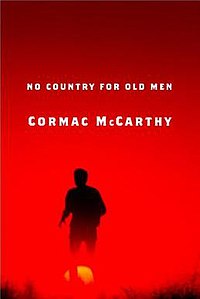
This weekend I finished reading No Country for Old Men by Cormac McCarthy. McCarthy is generally regarded as one of the most important American novelists (although of course it depends who you ask), and No Country for Old Men is from 2005, and was adapted into the 2007 Coen brothers movie of the same name, which I have not yet seen.
The story is mainly about three characters. Ed Tom Bell is what I would call the main protagonist, and he is a sheriff in the county where the beginning of the novel takes place. Anton Chigurh is the main antagonist, an enterprising, sociopathic bounty hunter on the trail of Llewelyn Moss, a 30 year old Vietnam veteran who welds for a living. Carla Jean, Moss' wife, is also notable for playing a part in the development of the themes of the book.
The novel begins when Moss is hunting in the desert and stumbles on a drug deal that went sour, finding everyone dead except one person. He takes the money he finds and goes home, only to return when he feels guilty for not giving the man water. He gets noticed and enfolded into a war over the money that is never fully fleshed out. Chigurh and another party hunt him while Bell follows the path of violence that ensues.
The book is almost the opposite of the last book I read. It sacrifices brevity and what I would consider a well-developed, well-explained plot for the purpose of developing its themes and characters.
McCarthy intentionally omits most information about the parties which actually want the money that Moss carries. He also purposefully omits a few scenes, preferring to describe them using the aftermath, and this surprised me the first time it happened. I am not sure I enjoyed this method of storytelling, especially as one of the scenes done in this matter was particularly central to the plot. That, combined with his penchant for brief (note: not a brief book) and often idiomatic language, made it difficult to follow along with what was going on.
The character at the centre of this plot, Moss, is perhaps the most underdeveloped of the four major characters. Bell is a very philosophic protagonist whose ruminations on life and old age frame the book, and Chigurh is a delightfully efficient, ruthless sociopath. Carla Jean, while her scenes are brief, acts as a foil to the world-weary Bell. The most interesting parts of the book are the ones in which the characters are interacting; both the violence and the conversations are engaging and interesting, although you certainly get a sense that all of the characters like to be brief in their speech. The setting is also well done. The Texas-Mexico border almost acts like another character, and also a theme of the book; the land, the story, and the characters are varying degrees of harsh, unforgiving, and worn-down.
The theme of the book seems to me to be fear and acceptance of your circumstances and choices. Bell goes on at length about the choices he has made, the choices his father and grandfather made, and the enormity of the duty bestowed upon him when he became a 'lawman.' To be honest, it all went a little bit further than I cared to read about, especially with the last 80 pages or so devoted to scenes featuring Bell and his wrestling with these concepts; they weren't terrible but I just did not find them all that interesting. Chigurh is a more interesting philosopher but less utilized; I found the few scenes concerning his views very rich.
This is an incredibly hard review to sum up. I liked the plot, but I wish that it was focused on more. There was a lot of thematic undercurrent to the novel, but I could not bring myself to care all that much; whether this is the author's fault or mine is difficult to say. The characters were interesting and developed through the novel, but I felt Bell was overdone (and this relates directly back to his philosophizing). The writing style is frustrating at times, even though it did lend the novel a strong sense of voice.
Coming from a background of reading lots of fantasy, it's hard to jump right into a book that so neatly makes its plot a secondary concern. I did appreciate the strong characterization and setting, but I needed something more substantial to tie everything together. When I go pick out another 'fiction and literature' book, I think that I will probably be looking for something that promises a more intriguing plot.

No comments:
Post a Comment